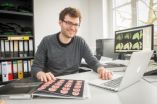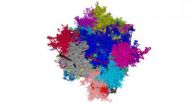(Press-News.org) Misplaced your keys? Can't remember someone's name? Didn't notice the stop sign? Those who frequently experience such cognitive lapses now have an explanation. Psychologists from the University of Bonn have found a connection between such everyday lapses and the DRD2 gene. Those who have a certain variant of this gene are more easily distracted and experience a significantly higher incidence of lapses due to a lack of attention. The scientific team will probably report their results in the May issue of "Neuroscience Letters," which is already available online in advance.
Most of us are familiar with such everyday lapses; can't find your keys, again! Or you walk into another room but forgot what you actually went there for. Or you are on the phone with someone and cannot remember their name. "Such short-term memory lapses are very common, but some people experience them particularly often," said Prof. Dr. Martin Reuter from the department for Differential and Biological Psychology at the University of Bonn. Mistakes occurring due to such short-term lapses can become a hazard in cases where, e.g., a person overlooks a stop sign at an intersection. And in the workplace, a lack of attention can also become a problem–so for example when it results in forgetting to save essential data.
A gene "directing" your brain
"A familial clustering of such lapses suggests that they are subject to genetic effects," explained Dr. Sebastian Markett, the principal author and a member of Prof. Reuter's team. In lab experiments, the group of scientists had already found indications earlier that the so-called dopamine D2 receptor gene (DRD2) plays a part in forgetfulness. DRD2 has an essential function in signal transmission within the frontal lobes. "This structure can be compared to a director coordinating the brain like an orchestra," Dr. Markett added. In this simile, the DRD2 gene would correspond to the baton, because it plays a part in dopamine transmission in the brain. If the baton skips a beat, the orchestra gets confused.
The psychologists from the University of Bonn tested a total of 500 women and men by taking a saliva sample and examining it using methods from molecular biology. All humans carry the DRD2 gene, which comes in two variants that are distinguished by only one letter within the genetic code. The one variant has C (cytosine) in one locus, which is displaced by T (thymine) in the other. According to the research team's analyses, about a quarter of the subjects exclusively had the DRD2 gene with the cytosine nucleobase, while three quarters were the genotype with at least one thymine base.
The scientists then wanted to find out whether this difference in the genetic code also had an effect on everyday behavior. By means of a self-assessment survey they asked the subjects to state how frequently they experience these lapses–how often they forgot names, misplaced their keys. The survey also included questions regarding certain impulsivity-related factors, such as how easily a subject was distracted from actual tasks at hand, and how long they were able to maintain their concentration.
Lapses can clearly be tied to the gene variant
The scientists used statistical methods to check whether it was possible to associate the forgetfulness symptoms elicited by means of the surveys to one of the DRD2 gene variants. The results showed that functions such as attention and memory are less clearly expressed in persons who carry the thymine variant of the gene than in the cytosine type. "The connection is obvious; such lapses can partially be attributed to this gene variant," reported Dr. Markett. According to their own statements, the subjects with the thymine DRD2 variant more frequently "fall victim" to forgetfulness or attention deficits. And vice versa, the cytosine type seems to be protected from that. "This result matches the results of other studies very well," added Dr. Markett.
Carriers of the gene variant linked to forgetfulness may now find solace in the fact that they are not responsible for their genes, and that this is just their fate....but Dr. Markett doesn't agree. "There are things you can do to compensate for forgetfulness; writing yourself notes or making more of an effort to put your keys down in a specific location–and not just anywhere." Those who develop such strategies for the different areas of their lives are better able to handle their deficit.
INFORMATION:
Publication: Sebastian Markett, Christian Montag, Corinna Diekmann, Martin Reuter: Dazed and confused: A molecular genetic approach to everyday cognitive failure, Neuroscience Letters, DOI: 10.1016/j.neulet.2014.02.052
Contact:
Dr. Sebastian Markett
Dept. for Differential and Biological Psychology
at the University of Bonn
Ph. +49 228-734219
Email: sebastian.markett@uni-bonn-diff.de
Genetic factor contributes to forgetfulness
University of Bonn psychologists prove genetic variation is underlying factor in higher incidence of forgetfulness
2014-03-21
ELSE PRESS RELEASES FROM THIS DATE:
Salivary biomarkers of gingivitis: Information important for personalized decision-making
2014-03-21
Alexandria, Va., USA – Today during the 43rd Annual Meeting & Exhibition of the American Association for Dental Research, held in conjunction with the 38th Annual Meeting of the Canadian Association for Dental Research, Craig Miller, University of Kentucky, Lexington, will present research titled "Salivary Biomarkers of Gingivitis: Information Important for Personalized Decision-Making."
Salivary biomarkers have been studied to help determine the presence, risk, and progression of periodontal disease. However, clinical translation of salivary biomarkers from bench to ...
Novel pro-resolving-medicines in periodontal regeneration
2014-03-21
Alexandria, Va., USA – Today during the 43rd Annual Meeting & Exhibition of the American Association for Dental Research, held in conjunction with the 38th Annual Meeting of the Canadian Association for Dental Research, Daniel Huy Nguyen, The Forsyth Institute, Cambridge, Mass., will present research titled "Novel Pro-Resolving-Medicines in Periodontal Regeneration."
Uncontrolled host defense mechanisms can significantly impede tissue engineering, regeneration and reconstruction of oral and craniofacial tissues. The anti-inflammatory and pro-resolving actions of lipoxins ...
Water fluoridation: Safety efficacy and value in oral health care
2014-03-21
Alexandria, Va., USA – Today during the 43rd Annual Meeting & Exhibition of the American Association for Dental Research, held in conjunction with the 38th Annual Meeting of the Canadian Association for Dental Research, a symposium titled "Water Fluoridation: Safety Efficacy and Value in Oral Health Care" will take place. This symposium will be chaired by Stephen H. Abrams, Cliffcrest Dental Office, Toronto, Ontario, Canada.
Community water fluoridation (CWF) and other fluoride modalities historically have been and remains the cornerstone for the prevention and control ...
9/11 linked to two heart disease culprits: Obstructive sleep apnea and PTSD
2014-03-21
Icahn School of Medicine at Mount Sinai researchers have linked high levels of exposure to inhaled particulate matter by first responders at Ground Zero to the risk of obstructed sleep apnea and post-traumatic stress disorder (PTSD), both conditions that may impact cardiovascular health.
The two separate studies were both presented on March 20 at the American Heart Association's EPI/NPAM 2014 Scientific Sessions in San Francisco, California by cardiologist Mary Ann McLaughlin, MD, MPH, principal investigator for the WTC-CHEST Program at Mount Sinai, a subset of the World ...
Food insecurity linked to cost-related medication underuse in chronically ill Americans
2014-03-21
Philadelphia, PA, March 21, 2014 – Chronically ill adults who reported food insecurity in their household (not having consistent access to food due to lack of financial stability) were significantly more likely to report cost-related medication underuse, according to a new study in The American Journal of Medicine,. The term cost-related medication underuse refers to taking less medication than prescribed, or not taking it at all due to financial concerns.
Despite renewed optimism about the economy, many people in the United States continue to feel financial hardships. ...
P&G Beauty to present advancements in skin care technologies at annual AAD Meeting
2014-03-21
Denver, CO (March 21, 2014) – Research presented by P&G Beauty scientists at the 72nd Annual Meeting of the American Academy of Dermatology (AAD) offers insights into new ingredient formulations and effective skin care routines. P&G Beauty will showcase several studies that address a range of topics including cellular bioenergetics, anti-aging technologies, microdermabrasion systems and sensitive skin body wash efficacy.
"P&G Beauty is proud to share our research at this year's AAD meeting, and is looking forward to collaborating with experts in the field of dermatology," ...
Preterm children at increased risk of having maths problems
2014-03-21
Researchers have found that preterm children are at an increased risk of having general cognitive and mathematic problems.
The new study by the University of Warwick and Ruhr-University Bochum, published in the Journal of Pediatrics, sought to understand the relationship between preterm birth and dyscalculia.
Dyscalculia, a learning disorder which involves frequent problems with everyday arithmetic tasks, is diagnosed when children do worse in maths than would be expected based on their general intelligence.
Study co-author Professor Dieter Wolke from the University ...
It looks like rubber but isn't
2014-03-21
The experimental and numerical study of the behaviour of polymers in concentrated solutions is a line of research that is still highly active. In the past, it enabled us to understand why materials like rubber have certain elastic properties. A distinctive feature of these systems is that the long "chained" molecules composing them tend to penetrate each other and interweave at their ends forming very durable bonds that make them always return to their initial conformation whenever they are "stretched".
The behaviour of dense solutions of "ring" polymers, i.e., polymers ...
Box-shaped pressure vessel for LNG developed by KAIST research team
2014-03-21
Pohang, Republic of Korea, March 21, 2014 – Earlier today, Korean researchers successfully showcased the installation and operation of a box-shaped, high-pressure tank for the storage of liquefied natural gas in Pohang, Republic of Korea. The development was the first of its kind in the world.
Pressure vessels have many applications and are widely used within the petrochemical, energy, and other industrial sectors where the transport and storage of many types of pressurized gases and fluids are essential. Pressure vessels must be designed, manufactured, installed, ...
Researchers develop a novel antibacterial orthodontic bracket cement
2014-03-21
Alexandria, Va., USA – Today, at the 43rd Annual Meeting & Exhibition of the American Association for Dental Research (AADR), held in conjunction with the 38th Annual Meeting of the Canadian Association for Dental Research, Mary Anne Sampaio de Melo, from the University of Maryland, Baltimore, will present a research study titled "Antibacterial Orthodontic Cement Containing a Quaternary Ammonium Monomer Dimethylaminododecyl Methacrylate."
Demineralized lesions in enamel around orthodontic brackets are caused by acids from biofilm accumulation. The objectives of this study ...
LAST 30 PRESS RELEASES:
A biological material that becomes stronger when wet could replace plastics
Glacial feast: Seals caught closer to glaciers had fuller stomachs
Get the picture? High-tech, low-cost lens focuses on global consumer markets
Antimicrobial resistance in foodborne bacteria remains a public health concern in Europe
Safer batteries for storing energy at massive scale
How can you rescue a “kidnapped” robot? A new AI system helps the robot regain its sense of location in dynamic, ever-changing environments
Brainwaves of mothers and children synchronize when playing together – even in an acquired language
A holiday to better recovery
Cal Poly’s fifth Climate Solutions Now conference to take place Feb. 23-27
Mask-wearing during COVID-19 linked to reduced air pollution–triggered heart attack risk in Japan
Achieving cross-coupling reactions of fatty amide reduction radicals via iridium-photorelay catalysis and other strategies
Shorter may be sweeter: Study finds 15-second health ads can curb junk food cravings
Family relationships identified in Stone Age graves on Gotland
Effectiveness of exercise to ease osteoarthritis symptoms likely minimal and transient
Cost of copper must rise double to meet basic copper needs
A gel for wounds that won’t heal
Iron, carbon, and the art of toxic cleanup
Organic soil amendments work together to help sandy soils hold water longer, study finds
Hidden carbon in mangrove soils may play a larger role in climate regulation than previously thought
Weight-loss wonder pills prompt scrutiny of key ingredient
Nonprofit leader Diane Dodge to receive 2026 Penn Nursing Renfield Foundation Award for Global Women’s Health
Maternal smoking during pregnancy may be linked to higher blood pressure in children, NIH study finds
New Lund model aims to shorten the path to life-saving cell and gene therapies
Researchers create ultra-stretchable, liquid-repellent materials via laser ablation
Combining AI with OCT shows potential for detecting lipid-rich plaques in coronary arteries
SeaCast revolutionizes Mediterranean Sea forecasting with AI-powered speed and accuracy
JMIR Publications’ JMIR Bioinformatics and Biotechnology invites submissions on Bridging Data, AI, and Innovation to Transform Health
Honey bees navigate more precisely than previously thought
Air pollution may directly contribute to Alzheimer’s disease
Study finds early imaging after pediatric UTIs may do more harm than good
[Press-News.org] Genetic factor contributes to forgetfulnessUniversity of Bonn psychologists prove genetic variation is underlying factor in higher incidence of forgetfulness



